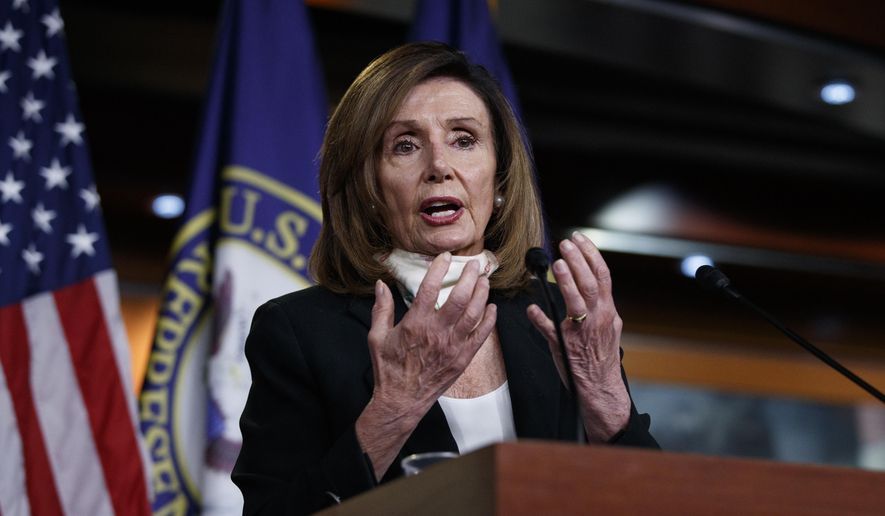Speaker Nancy Pelosi was forced to yank from the House floor a Democrat-backed bill to reauthorize government spy powers Thursday, blaming Republicans for the failure to ram through a measure that she had vowed to pass “one way or another.”
The blowup of the legislation delivered a near-term victory for President Trump, who threatened to veto the measure because it didn’t do enough to curb the Foreign Intelligence Service Act, which was used to spy on his 2016 campaign and promote Russia collusion conspiracy theories.
Mr. Trump reveled in the chaos in Mrs. Pelosi’s chamber.
“Thank you our GREAT Republican Congressmen & Congresswomen on your incredibly important blockage last night of a FISA Bill that would just perpetuate the abuse that produced the Greatest Political Crime In the History of the U.S., the Russian Witch-Hunt. Fantastic Job,” he tweeted.
It was not the first time the spy powers, also known as the Patriot Act, caught a snag in Congress. Lawmakers have always found a way to stitch it back together, but this time Mr. Trump throws a new wrinkle into the negotiations.
“The president tweeted that he would veto the bill, and House Republicans abandoned their support for our national security,” Mrs. Pelosi told fellow Democrats in a letter explaining the decision to pull the bill. “Clearly because House Republicans have prioritized politics over our national security, we will no longer have a bipartisan veto-proof majority.”
The setback forced Mrs. Pelosi, California Democrat, to open talks with Senate Republicans to hammer out a deal that would satisfy privacy hawks on both sides of the aisle but especially in the Oval Office.
Civil liberties advocates who opposed the bill, which reauthorizes three expired government surveillance powers, said the turn of events was a black eye for Mrs. Pelosi.
They also worried that Mrs. Pelosi could still succeed in removing language that would curb the government’s authority to monitor American citizens.
“The concern is Pelosi is going to advocate for a worse bill behind the scenes,” said Jason Pye, vice president of legislative affairs at FreedomWorks, a conservative advocacy group.
Negotiations between the Democrat-run House and Republican-controlled Senate are expected to start quickly but could last weeks or possibly months if the two sides dig in.
The House was expected to easily approve the FISA bill this week after it won significant bipartisan support when it passed in March. The bill next went to the Senate, which made modest changes and returned it to the House.
Republican support for the bill collapsed this week after Mr. Trump threatened to veto it.
“If the FISA Bill is passed tonight on the House floor, I will quickly VETO it,” he tweeted as the House debate opened Wednesday. “Our Country has just suffered through the greatest political crime in its history. The massive abuse of FISA was a big part of it!”
House Democrats canceled the vote scheduled for Wednesday when Republican support evaporated and liberal Democrats defected in droves.
Mrs. Pelosi tried to marshal support Thursday among her rank and file, but the far-left wing of her party wouldn’t budge, saying the changes were not enough to protect Americans from government abuse.
Roughly 100 liberals refused to back the legislation, leaving Democrats without a veto-proof majority.
Democratic leaders found a familiar scapegoat.
“The Republicans abandoned this bipartisan project for one reason and one reason only: The president tweeted on a whim and told them to oppose this bill,” said House Judiciary Committee Chairman Jarrold Nadler, New York Democrat. “What changed other than the president’s tweets?”
Mr. Trump’s objections to renewing FISA, a 1970s law that allows the government to surveil Americans and foreigners suspected of terrorism or spying, stem from FBI abuses of the law to monitor Carter Page, an aide to his 2016 campaign.
Justice Department Inspector General Michael Horowitz reviewed the FISA warrant for Mr. Page and concluded it contained significant flaws and omissions. A follow-up report released after the House approved the bill found the FBI’s bungling of FISA warrants extended beyond Mr. Page.
The inspector general reports spurred the Republican revolt, said Rep. Jim Jordan of Ohio, the top Republican on the Oversight and Reform Committee.
“Everything has changed,” he said. “The main change is, it’s worse than we thought. From March 10 when this body last dealt with the FISA legislation, all kinds of things have changed.”
Although Mr. Trump has blasted the House bill, he has not said what changes he wants or how it could win his support.
Although the president remained mum while the bill was approved in the House, he lashed out after the Senate added language to protect Americans from unwarranted spying.
One addition was an amendment from Sens. Mike Lee, Utah Republican, and Patrick J. Leahy, Vermont Democrat, to increase the role of outside legal experts to scrutinize FBI surveillance requests.
“I don’t think Trump knows exactly what he wants,” said Mr. Pye of Freedomworks. “His opposition to the bill came when the bill had included protections that would have prevented the Carter Page issue. The Lee-Leahy amendment would have prevented it.”
Mr. Trump inserted himself into the FISA debate in 2018 when another FISA provision was set to lapse. The president opposed reauthorization before reversing course and supporting the bill.
FISA supporters warn this time could be different.
“The complete failure of the House leadership to work with the White House and the Senate to find a rational path forward on this critical national security authority is dangerous and is making America massively less safe today,” said Jamil N. Jaffer, who served as assistant White House counsel under President George W. Bush.
• Jeff Mordock can be reached at jmordock@washingtontimes.com.




Please read our comment policy before commenting.